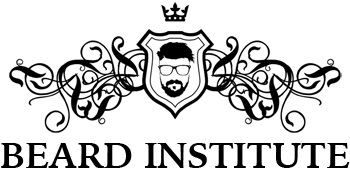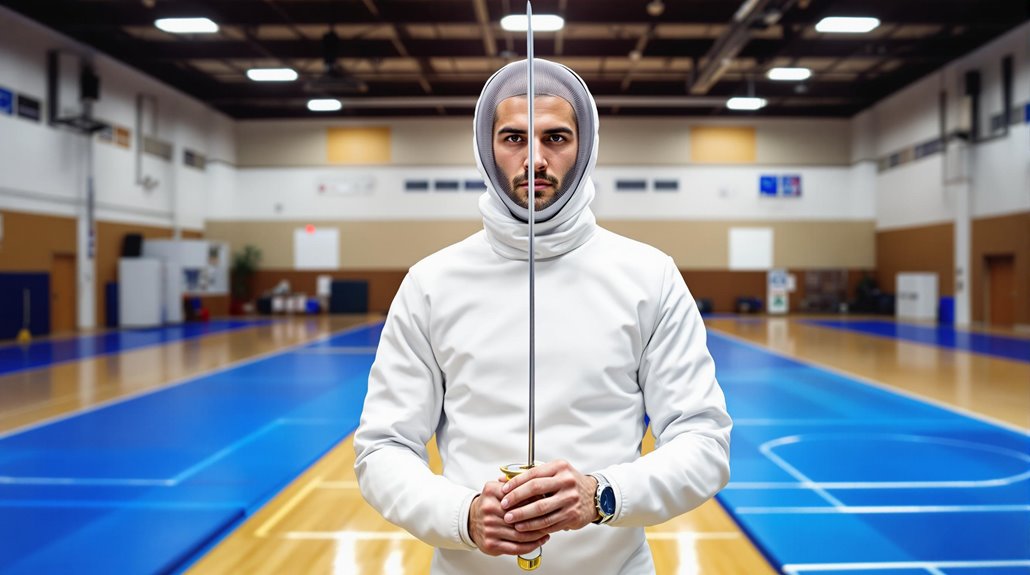Does Chick-Fil-A Allow Beards?
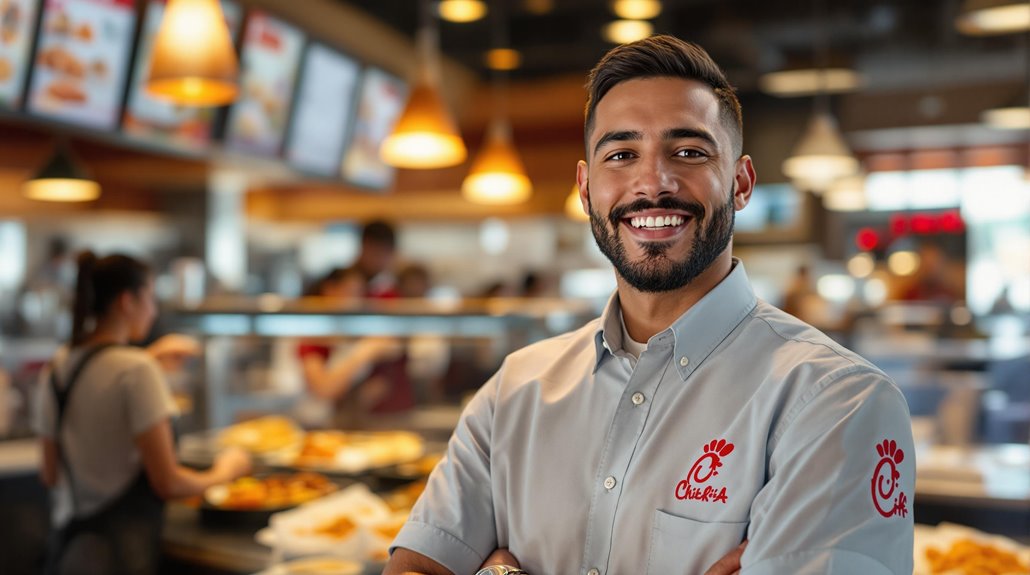
If you're considering a job at Chick-fil-A and wondering about facial hair policies, be aware that beards aren't allowed. The company maintains a strict grooming policy that emphasizes a clean-cut appearance, permitting only neatly trimmed mustaches. Beards and other styles of facial hair are prohibited to preserve the brand's polished image. While some exceptions for religious or medical reasons might be made, the focus is on a professional look. Employee perspectives show mixed feelings about these rules, suggesting potential for policy change in the future. There's more to this topic that might interest you further.
Chick-Fil-A Grooming Policy
Chick-fil-A's grooming policy is clear and strict, emphasizing a clean-cut appearance for all employees. If you're working there, you must comply with specific standards to guarantee a neat and professional look. Regarding hair, only natural colors are allowed, avoiding eccentric styles that could distract from the customer experience. Your hair must be clean and restrained, adhering to both the company's guidelines and local health department regulations.
Facial hair guidelines are similarly precise. While beards and other facial hair styles are strictly prohibited, neatly trimmed mustaches are permitted. Sideburns must also be kept in check, trimmed to the bottom of your earlobe to maintain uniformity and professionalism. This attention to detail reflects Chick-fil-A's dedication to its brand image and customer service standards.
Regular inspections may occur, confirming all employees are meeting these grooming standards. It's vital to understand that these rules aren't just about appearance—they're designed to foster a consistent, distraction-free environment that aligns with Chick-fil-A's values. By complying with the grooming policy, you contribute to the company's commitment to excellence and customer satisfaction.
Facial Hair Guidelines
Moving from the general grooming policy to specific facial hair guidelines, you'll find that Chick-fil-A sets clear expectations. The company allows only neatly trimmed mustaches for male employees, guaranteeing a consistent and professional appearance. Beards and other facial hair styles, however, are strictly off-limits under Chick-fil-A's grooming policies. This aligns with the brand's emphasis on maintaining a polished employee appearance that reflects their brand image positively.
In addition to the mustache rule, sideburns must be kept trimmed to the bottom of the earlobe. These detailed facial hair guidelines help guarantee that employees present a neat and tidy look, vital for customer interactions. The focus on professional appearance extends to other aspects of personal grooming, including visible tattoos and body modifications. Both are prohibited in customer service areas, maintaining the brand's clean-cut image.
Mustache Regulations
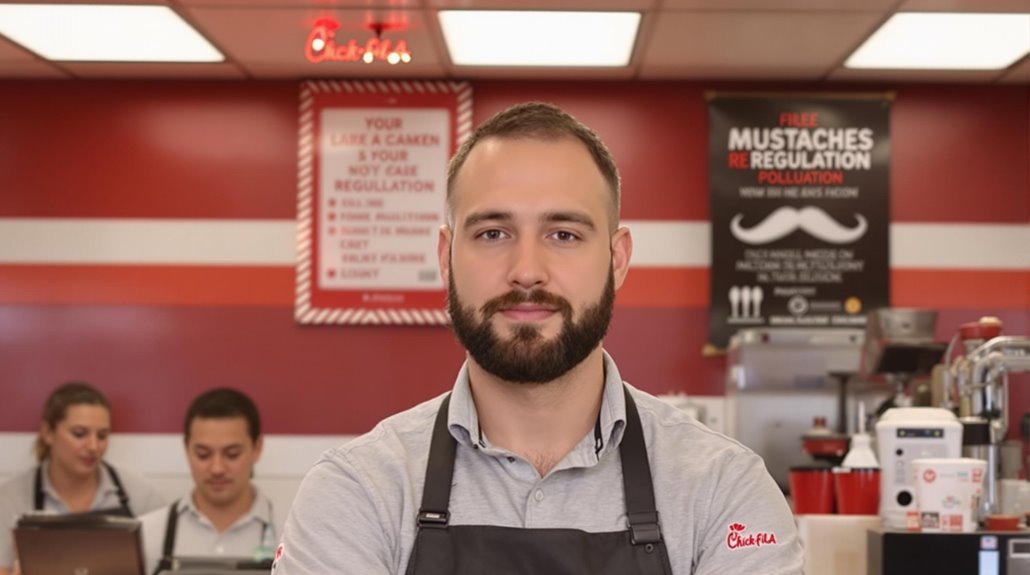
Regarding mustache regulations at Chick-fil-A, precision and neatness are key. If you're considering a role with Chick-fil-A, it's crucial to know that beards are strictly off-limits for male employees. However, mustaches are allowed under specific conditions. They must be neatly trimmed, keeping them short and well-groomed to guarantee a professional appearance. This focus on maintaining a tidy look is part of Chick-fil-A's broader grooming standards, which emphasize consistency and uniformity among all employees.
To comply with these regulations, you'll need to verify that your mustache is carefully defined and doesn't extend beyond the corners of your mouth. It's all about presenting a clean image that aligns with Chick-fil-A's commitment to a polished brand identity. Sideburns also have their own set of rules, needing to be trimmed to reach no lower than the bottom of your earlobe. This contributes to the uniform grooming standards that Chick-fil-A values.
Exceptions and Accommodations
While mustache regulations at Chick-fil-A are clear and consistent, there are situations where exceptions and accommodations may come into play. If you're an employee looking to understand how these might apply to you, consider the following:
- Religious or Ethnic Needs: Chick-fil-A may consider exceptions to the grooming policy for religious or ethnic grooming needs. Requests are assessed individually, so it's essential to discuss your specific situation with your operator.
- Operator Discretion: The operator has the authority to make appearance-related decisions. This means accommodations for unique grooming concerns can be made, but it's not guaranteed. Establish open communication with your operator to investigate possible solutions.
- Professional Appearance: Despite potential exceptions, maintaining a professional appearance is vital. Visible body modifications, including beards, aren't generally acceptable in customer-facing roles, ensuring uniformity and compliance with company standards.
- Local Health Compliance: Compliance with local health department standards is non-negotiable. These standards often reinforce the prohibition of certain facial hair styles, like beards, especially in food service environments.
Employee Reactions
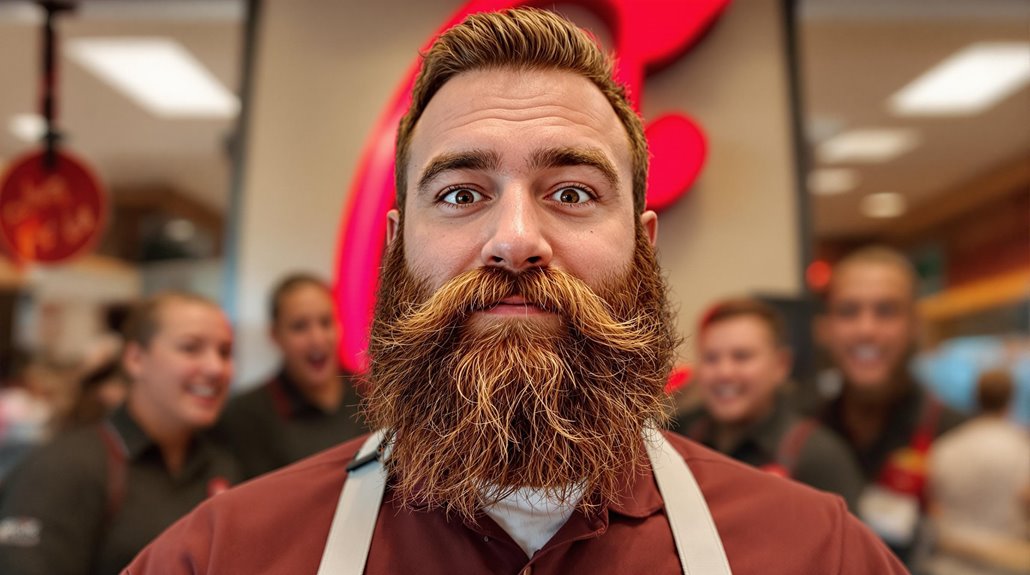
Amidst the backdrop of Chick-fil-A's strict facial hair policy, employee reactions have been a mix of frustration and debate. Many team members feel the grooming standards are outdated, especially when compared to other industries that have relaxed their policies. This has led to significant discussion on social media platforms like TikTok, where team members and the public engage in discussions over these grooming standards, often highlighting broader societal shifts towards inclusivity.
You might find it surprising that some members have shared personal stories of being reprimanded or even sent home due to non-compliance with the no-beard policy. These experiences underscore how such strict regulations can impact their work life negatively. The frustration doesn't just stem from the policy itself but also from how it contrasts with more progressive approaches seen in fields like EMS and law enforcement, where facial hair is becoming more accepted.
The debate around Chick-fil-A's facial hair policy isn't merely about beards; it's also about inclusivity and accepting diverse grooming preferences. As societal norms evolve, many employees hope for a shift towards policies that reflect these changes, promoting a more inclusive workplace environment.
Impact on Brand Image
Chick-fil-A's insistence on maintaining strict grooming standards, including a no-beard policy, directly influences how the brand is perceived. By prioritizing a clean-cut look, they aim to make a positive initial impression on customers. This approach is not just about appearances; it's about reflecting their commitment to customer service and personal hygiene. A polished appearance can convey reliability and professionalism, fundamental traits in the fast-food industry.
- Worn in Good Taste: Employees are expected to present themselves in a manner that's tasteful, which underscores the brand's dedication to professionalism.
- Consistent Width: Upholding grooming standards like a no-beard policy helps maintain uniformity among staff, reinforcing the brand's cohesive identity.
- Comply with Local Health: These grooming practices might help prevent health violations, guaranteeing that food safety standards are always upheld.
- Appropriate Application of Body: By focusing on personal presentation, Chick-fil-A guarantees that staff apply themselves appropriately, enhancing the dining experience.
Social media platforms like TikTok amplify discussions about these policies, indicating a growing public interest. Ultimately, by maintaining these standards, Chick-fil-A aligns its brand image with its core values, emphasizing quality and service excellence.
Future Policy Considerations
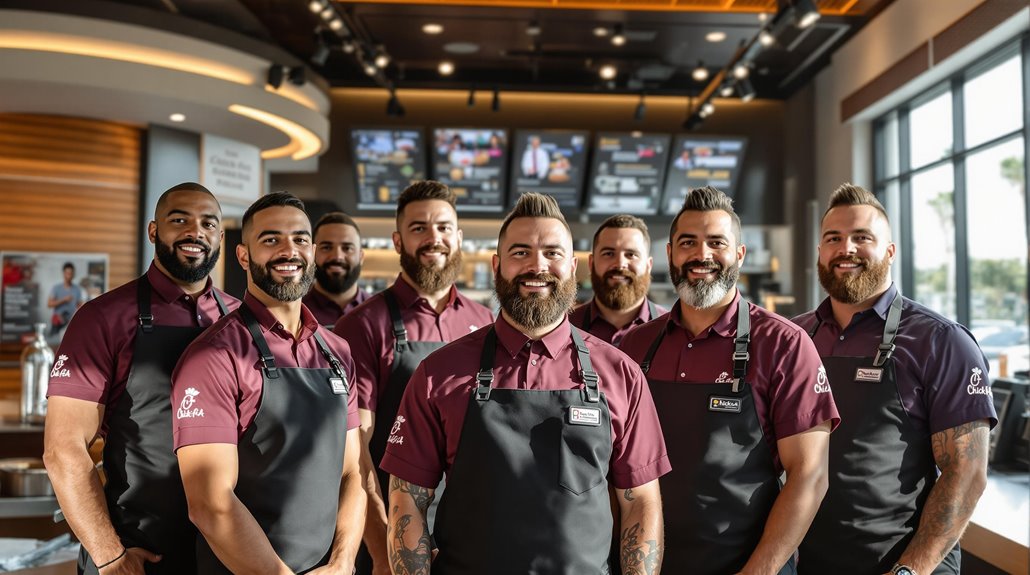
As societal norms evolve, companies like Chick-fil-A may need to adapt their grooming policies to stay competitive. With the growing acceptance of beards across different industries, Chick-fil-A's current grooming policy, which prohibits beards but allows neatly trimmed mustaches, may seem outdated. Employee feedback and social media discussions could play a significant role in prompting the company to reconsider its stance on facial hair. Listening to employees' perspectives can offer valuable insights that help modernize appearance guidelines.
If Chick-fil-A's competitors begin adopting more flexible grooming regulations, the pressure to revisit their policies will likely increase. Adapting to these shifts is vital for talent retention, as potential employees may opt for workplaces with more relaxed standards that respect personal expression. By aligning with broader cultural shifts, Chick-fil-A can guarantee its policies are inclusive and appealing to a diverse workforce.
Continuously evaluating grooming policies in response to cultural changes and employee satisfaction is fundamental. By doing so, Chick-fil-A can stay relevant and competitive. Future policy considerations might lead to a more flexible approach to beards, reflecting the company's commitment to evolving with the times and maintaining its reputation as a desirable employer.
